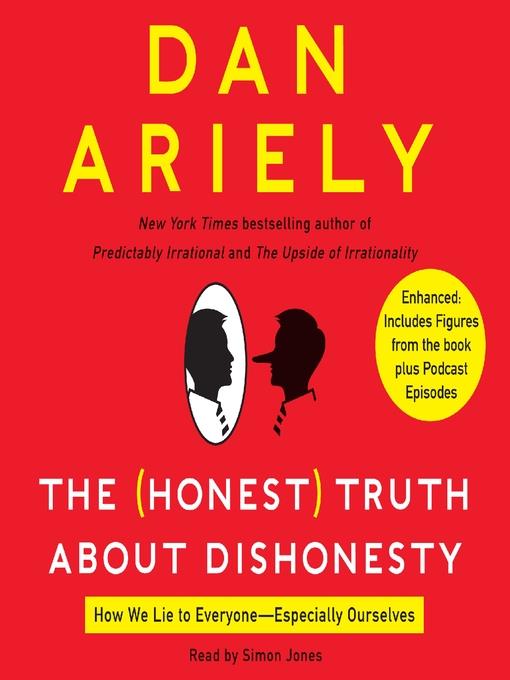
The Honest Truth About Dishonesty
فرمت کتاب
audiobook
تاریخ انتشار
2012
نویسنده
Gandee Vasanنویسنده
Dean Jensenنویسنده
Gandee Vasanنویسنده
Dean Jensenنویسنده
Simon Jonesناشر
HarperAudioشابک
9780062209320
کتاب های مرتبط
- اطلاعات
- نقد و بررسی
- دیدگاه کاربران
نقد و بررسی

April 9, 2012
In this captivating and astute study, behavioral scientist and professor Ariely (Predictably Irrational: The Hidden Forces That Shape Our Decisions) turns his hand to the topic of human honesty, or lack thereof. Through a series of tests and experiments, Ariely breaks down economist Gary Becker’s Simple Model of Rational Crime (SMORC), which suggests that we evaluate situations using a rational calculation of the costs and benefits of engaging in dishonest behavior while maintaining a positive view of ourselves. Because Ariely believes this model to be incomplete, he energetically sets out to determine which forces (psychological, environmental, social) cause people to cheat, and then applies this improved understanding to doing something about dishonesty. In addition to his experimental subjects, he examines the behavior of golfers, pharmaceutical reps, finance professionals, and others. In his characteristic spry, cheerful style, Ariely delves deep into the conundrum of human (dis)honesty in the hopes of discovering ways to help us control our behavior and improve our outcomes. Agent: James Levine.

January 1, 2012
It's not just Enron; we all cheat, from sneaking extra cookies to padding our resumes. Behavioral economist Ariely isn't here to scold us but to tell us why we cheat and how we can become more honest. With a 100,000-copy first printing.
Copyright 2012 Library Journal, LLC Used with permission.

May 15, 2012
What motivates dishonesty? In his latest book, Ariely (psychology & behavioral economics, Duke Univ.; The Upside of Irrationality: The Unexpected Benefits of Defying Logic at Work and at Home) explains the psychological and economic factors that drive people to lie and cheat. He explores the rational cost-benefit forces that propel dishonesty, such as the amount of money to be gained, the probability of being caught, and conflicts of interest. To illustrate his argument, Ariely cites examples ranging from the Enron scandal to Ponzi schemes to owning fake designer bags. Along with a list of additional readings, he provides descriptions of research studies, including his own, to support his theories. VERDICT Ariely writes thoughtfully and his sense of humor is evident throughout the book. A quick and easy read, this is for anyone who wants to learn about the psychological and economic causes of dishonesty. [See Prepub Alert, 12/16/11.]--Tina Chan, Penfield Lib., SUNY Oswego
Copyright 2012 Library Journal, LLC Used with permission.

May 1, 2012
Ariely (Psychology/Psychology and Behavioral Economics/Duke Univ.; The Upside of Irrationality, 2010, etc.) explores how honest we are, how honest we think we are and every white lie in the middle. Conventional wisdom suggests that the greatest concentration of dishonest Americans can be found in the Washington, D.C., area. While it's true that our leaders provide us with egregious examples of dishonesty, a more nuanced look at how we define the concept reveals that our moral compasses may be less dependable than we would like to believe. Ariely's prior books regarding irrationality flow into his research around what motivates people's dishonesty. He argues against the idea that deciding whether or not to cheat is fueled by a cost/benefit analysis. He also finds that the notion of the decision-making process being largely internal is also inaccurate and shares examples of corporate culture's enabling of dishonesty. It's far simpler for the media to identify the Kenneth Lay in the story than to explain how hundreds of employees--unlikely to all be maliciously and intentionally undermining the financial security of thousands of people--could participate in an organizational structure that rewards the bending of the rules. Lawyers round up on billable hours, and those who stick to an honest assessment of how much they work are culled from the firm come evaluation time. Ariely also argues convincingly that society's move toward a cashless society is lessening the moral impact when a few people fudge the numbers slightly--it eventually adds up to billions of dollars in losses. The author dissects dishonesty in schools, relationships and workplaces and examines institutional and cultural safeguards and their levels of effectiveness. Ariely writes in a conversational tone one might associate with a popular teacher, providing readers with a working knowledge of what shapes our ethics--or lack thereof.
COPYRIGHT(2012) Kirkus Reviews, ALL RIGHTS RESERVED.

May 15, 2012
The author of Predictably Irrational (rev. ed., 2009) again turns his keen mind to the realm of irrational decision-making, this time in an effort to understand the causes of and reveal interesting ways to limit our seemingly intrinsic capacity for dishonesty. Through a remarkable series of experiments, Ariely presents a convincing case that while we all want to view ourselves as honest, we have a strong desire to reap the benefits cheating brings while continuing to view ourselves as honest, wonderful people. We rationalize our misbehaviors by chalking them up to lack of willpower, the what-the-hell effect, creativity, or even a blatant desire for retribution. Ariely argues that in so doing, however, we increase the fudge factor, a process that produces further dishonesty that can quickly lead to future actions and even become contagious to those around us. Lucid and succinct as always, Ariely ably identifies the primary reasons for dishonesty and adds a few pointers, such as moral reminders, to help us curb future actions. Required reading for politicians and Wall Street executives.(Reprinted with permission of Booklist, copyright 2012, American Library Association.)

























دیدگاه کاربران